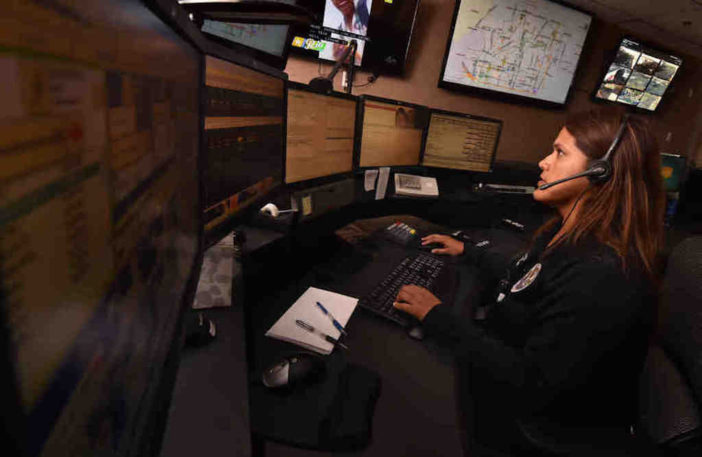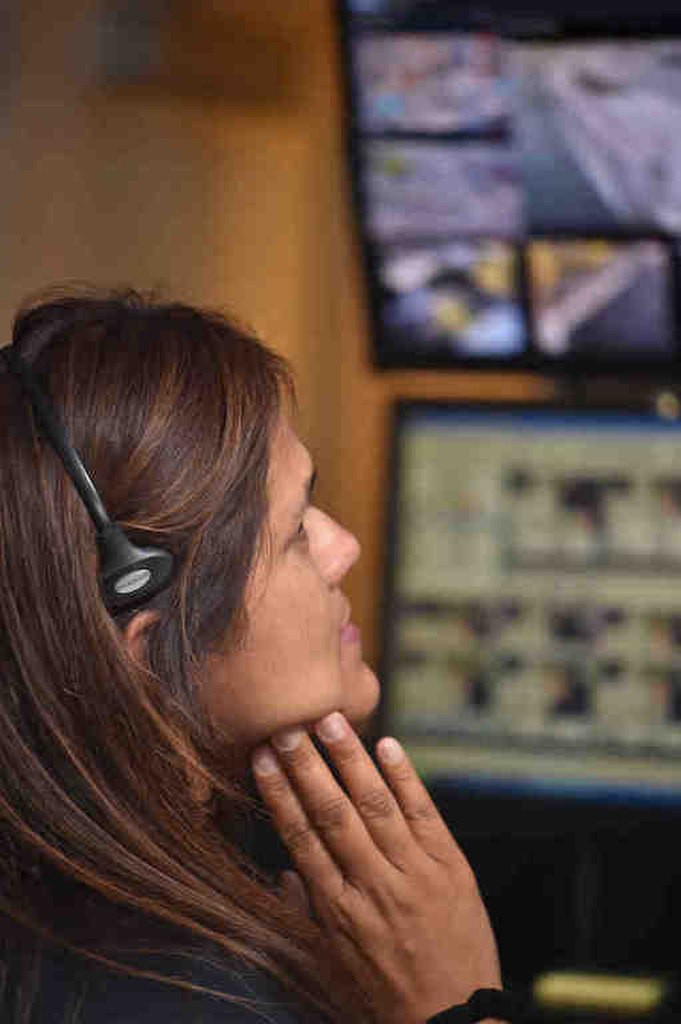“Shots fired!”
“Officer down!”
The words resonated through Fullerton Police Lead Dispatcher Tina Ortega’s headset, frenetically reported by an officer whose traffic stop deteriorated into gunfire.
The officer was wounded but alive.
“That silence before you know that everything is OK … that is the longest silence,” said Ortega, an FPD dispatcher for nine years. “Your adrenaline starts going and your training kicks in and you go on autopilot.”
On that call, Ortega put out continuous radio updates and assisted with coordinating units to set up a perimeter around the scene.
Meanwhile, backup dispatchers called for paramedics and gathered information that could be helpful in tracking down the suspects and their vehicle.
The suspects were eventually located and arrested.
But while all that was going on, “The public didn’t know that an officer had been shot so the calls didn’t stop,” Ortega said.
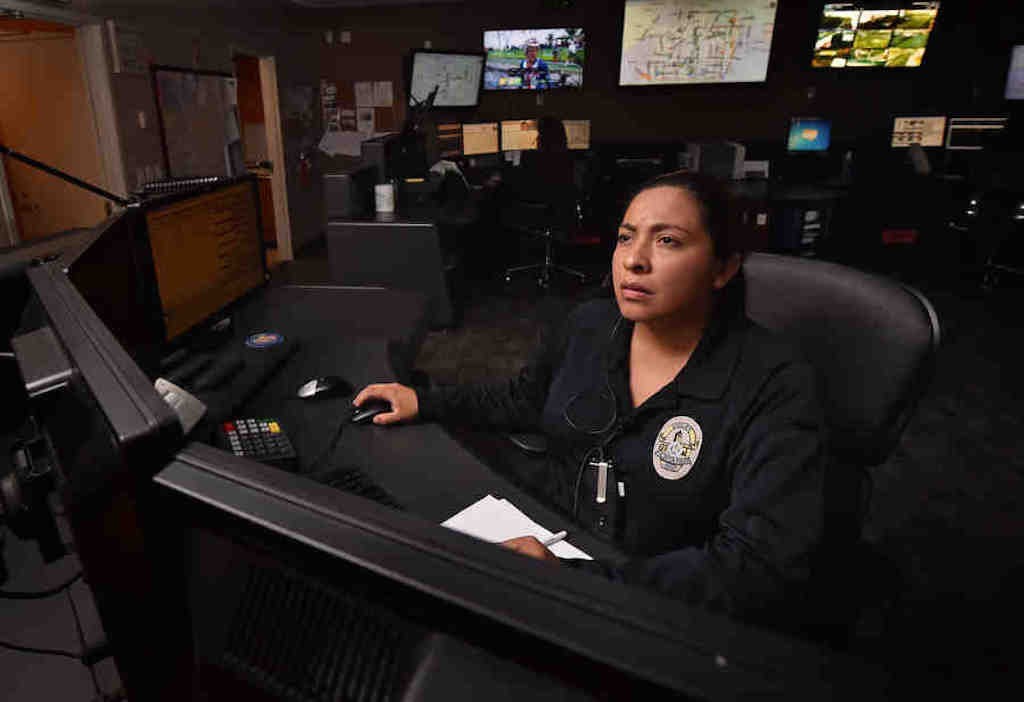
Fullerton PD Dispatcher C. Finn takes calls from the public at the dispatch center.
Photo by Steven Georges/Behind the Badge OC
Fullerton dispatchers have to multi-task up to 34 phone lines and numerous radio frequencies.
Such is the life of Fullerton Police dispatchers, who collectively process approximately 560 calls per day — everything from the complaint about a next-door neighbor’s noisy party to officer-involved shooting calls.
“Each day we come in, it’s something different,” said Dispatcher J. Ruiz, who has been on the job for nine years.
Of the 560 daily calls, about 150 are 911 calls, said Cesar Navarro, the Communications Center Administrative Lead Dispatcher.
Fullerton Police dispatchers, in fact, answer all incoming 911 calls for service within the city boundary, whether police or fire related. Fire or medical calls, however, are transferred to the Fire Department.
However, not all 911 calls are actual emergencies, Navarro said.
Citizens sometimes call 911 to report loud parties, barking dogs, and even power outages. And dispatchers frequently remind callers that 911 should only be called for life- threatening emergencies or crimes in progress.
They recommend the public program the police non-emergency phone number, 714-738-6700, on their cell phone.
Pocket dials and misdials, sometimes made by young children playing with their parents’ cell phones, also tie up 911 lines, Navarro said.
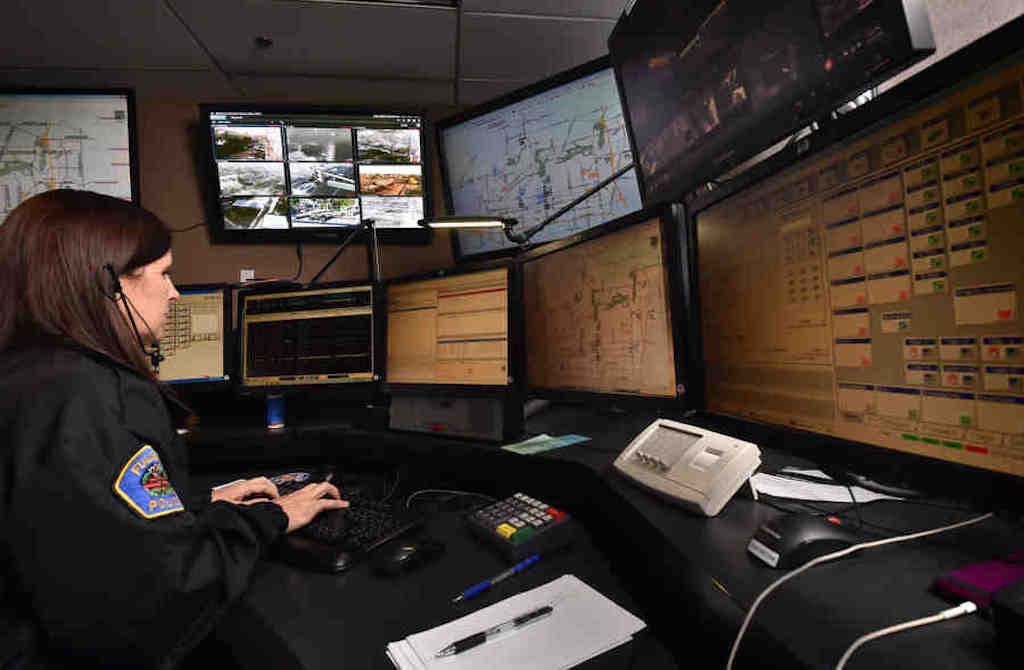
Fullerton PD Dispatcher M. Rodriquez works the radio dispatch station with computer screens that show calls being worked on, a map showing where patrol cars are located and even a screen displaying the scene from cameras that are placed around police headquarters and throughout the city. Her station talks to and assigns officers to calls while other dispatchers take the calls from the public.
Photo by Steven Georges/Behind the Badge OC
“I like to say we are the first, first responders because we are the initial person handling that emergency call for service,” Navarro said.
On average, three dispatchers, who work 12-hour shifts, are on duty at any given time, Navarro said.
They’re stationed in a room as dark as a movie theater, each sitting at a desk with seven TV monitors in front of them.
They’re the central nervous system of the police department and responsible for the safety of their officers and residents.
One monitor shows a map of the city and a dispatcher can see where patrol officers are in real time and where they need to go.
Another monitor shows a list of the calls that have been assigned and the ones in queue.
Video cameras positioned around downtown and the transportation center capture live video feeds that appear on another monitor.
Dispatchers can communicate with any agency in the county and are the liaison between the public and the officers on patrol.
When they get a call, they ask the “who, what, when and where,” Navarro said.
Are there weapons or drugs involved? Is it a domestic violence situation?
“They process it, they interpret it,” Navarro said. “People are panicked when reporting an emergency. Dispatchers have to try and calm the caller and firmly take control of the call to get the information they need.”
Dispatchers must be able to multitask, work under stress, process information quickly and have patience, especially when the caller at the other end doesn’t. Behind their headset they deal with life-and-death situations on a daily basis: babies not breathing, shootings, stabbings, fatalities, suicides.
Dispatchers have an inter-departmental peer support network they can count on to help mitigate the impact.
“If you get worked up, you are not going to help (callers) at all,” said Finn, an FPD dispatcher for eight years.
FPD dispatchers undergo 120 hours of academy training and must pass a test before they get hired. They also maintain continuous state-mandated training on topics such as suicidal callers and active shooters.
Then they go through six to nine months of intense training on the job, Navarro said.
“Once they start taking the calls for service … the screaming, the yelling … then they realize what they got themselves into,” Navarro said.
Dispatchers are typically on the job for about two years before they feel fully comfortable, he said.
Ruiz, who prior to becoming a dispatcher worked as an instructional aide at a teen parent program, said: “At first I was overwhelmed. The training was really difficult.”
But dispatching becomes second nature to these professionals.
Sometimes, the information dispatchers gather and then pass along to officers can prove to be lifesaving.
Rodriquez once took a call from an employee at a business who said the female owner was being assaulted by a male employee.
When officers arrived, the suspect was gone, but he had told the owner he was coming back to kill her.
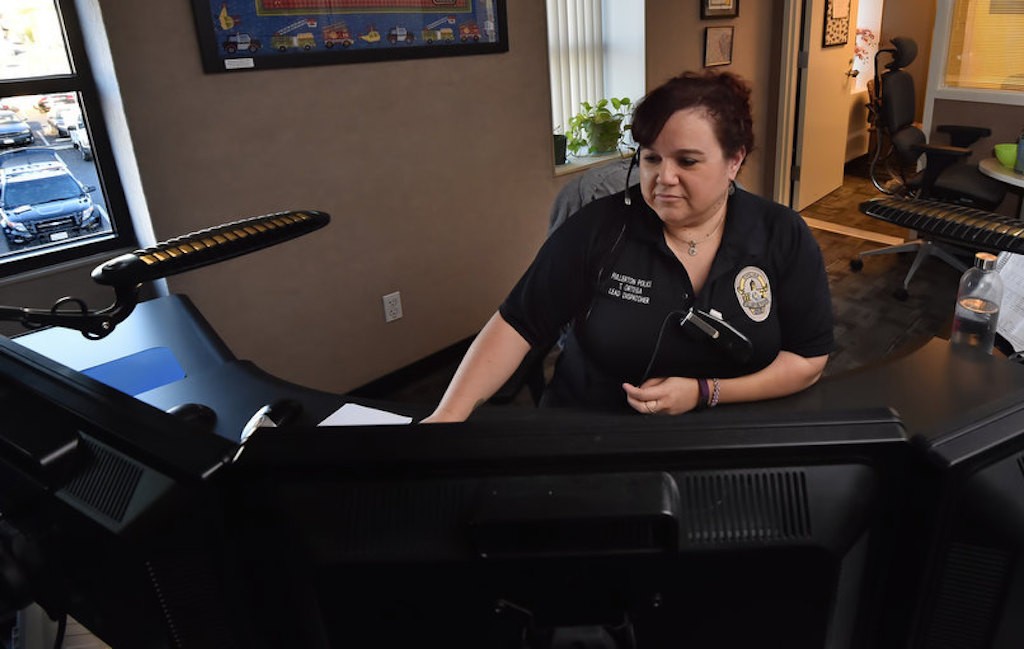
Fullerton PD Lead Dispatcher Tina Ortega works one of the dispatch stations taking calls from the public as well as handling any questions from the other dispatchers in the room. Photo by Steven Georges/Behind the Badge OC
Rodriquez, a 12-year veteran, and Navarro worked together to get as much background information as possible on the suspect.
Though she was not required to do so, Rodriquez discovered the suspect had guns registered in his name and passed that information along to officers at the scene.
“You just have to go with your instinct with a lot of things and that is just something you learn on the job,” she said. “Once they knew he could come back with a gun, they were better prepared.”
The suspect did, in fact, return armed with a gun, and when he saw officers, raised his weapon.
Officers fired and hit the suspect.
At the department’s annual awards and promotions ceremony, Navarro and Rodriquez were given Certificates of Commendation from Chief Dan Hughes for their actions.
Because of Rodriquez’s initiative, all background checks performed by dispatchers now automatically include information on firearms registration.
Rodriquez also serves as a Tactical Dispatcher on the North County SWAT Team, which is comprised of numerous north county law enforcement agencies.
Her knowledge, training and experience allow her to be part of the team that responds to high-risk incidents such as barricaded suspects and hostage situations.
Outsiders might be hard-pressed to find a dispatcher who’s been shocked by a reported activity that most people would find bizarre.
Reports of people walking around naked are more common than one might think.
Since the Pokémon craze has hit, concerned residents call 911 reporting suspicious activity by groups walking around town, perhaps trespassing on school property or climbing fences.
But it’s this diverse array of calls that make the job exciting, Navarro said.
“It’s an amazing job,” he said. “Every day is different. You never know what that next 911 call is going to be. You just have to be prepared.”
 Behind the Badge
Behind the Badge
